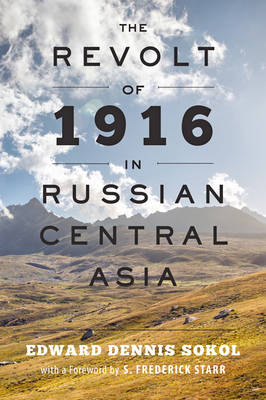13%OFF

Stock image for illustration purposes only - book cover, edition or condition may vary.
The Revolt of 1916 in Russian Central Asia
Edward Dennis Sokol
€ 29.99
€ 26.17
FREE Delivery in Ireland
Description for The Revolt of 1916 in Russian Central Asia
Paperback. Essential reading for historians, political scientists, and policymakers, this reissued edition is being published to coincide with the centennial observation of the genocide. Series: The Johns Hopkins University Studies in Historical and Political Science. Num Pages: 208 pages, 1, 1 maps. BIC Classification: 1DVUA; 3JJF; HBJD; HBTV; HBTZ; HBWN. Category: (U) Tertiary Education (US: College). Dimension: 230 x 351 x 15. Weight in Grams: 298.
During the summer of 1916, approximately 270,000 Central Asians-Kazakhs, Kyrgyz, Tajiks, Turkmen, and Uzbeks-perished at the hands of the Russian army in a revolt that began with resistance to the Tsar's World War I draft. In addition to those killed outright, tens of thousands of men, women, and children died while trying to escape over treacherous mountain passes into China. Experts calculate that the Kyrgyz, who suffered most heavily, lost 40% of their total population. This horrific incident was nearly lost to history. During the Soviet era, the massacre of 1916 became a taboo subject, hidden in sealed archives and banished from history books. Edward Dennis Sokol's pioneering Revolt of 1916 in Russian Central Asia, published in 1954 and reissued now for the first time in decades, was for generations the only scholarly study of the massacre in any language. Drawing on early Soviet periodicals, including Krasnyi Arkhiv (The Red Archive), Sokol's wide-ranging and exhaustively researched work explores the Tsarist policies that led to Russian encroachment against the land and rights of the indigenous Central Asian people. It describes the corruption that permeated Russian colonial rule and argues that the uprising was no mere draft riot, but a revolt against Tsarist colonialism in all its dimensions: economic, political, religious, and national. Sokol's masterpiece also traces the chain reaction between the uprising, the collapse of Tsarism, and the Bolshevik Revolution. A classic study of a vanished world, Sokol's work takes on contemporary resonance in light of Vladimir Putin's heavy-handed efforts to persuade Kyrgyzstan to join his new economic union. Sokol explains how an earlier Russian conquest ended in disaster and implies that a modern conquest might have the same effect. Essential reading for historians, political scientists, and policymakers, this reissued edition is being published to coincide with the centennial observation of the genocide.
Product Details
Publisher
Johns Hopkins University Press
Format
Paperback
Publication date
2016
Series
The Johns Hopkins University Studies in Historical and Political Science
Condition
New
Number of Pages
208
Place of Publication
Baltimore, MD, United States
ISBN
9781421420509
SKU
V9781421420509
Shipping Time
Usually ships in 4 to 8 working days
Ref
99-2
About Edward Dennis Sokol
Edward Dennis Sokol (1923-2014) earned his BA from Johns Hopkins University in 1947 and his PhD in 1952. S. Frederick Starr is the founding chairman of the Central AsiaCaucasus Institute and Silk Road Studies Program. He is the author of Lost Enlightenment: Central Asia's Golden Age from the Arab Conquest to Tamerlane.
Reviews for The Revolt of 1916 in Russian Central Asia
Sokol's recitation of events has a compelling clarity. In 180 pages, he conveys the flavor of a region, a historical snapshot of a massacre, and several important observations.
International Journal on World Peace
Sokol carefully recreates events on the ground while relating some of the more instructive moments of the uprising... Sokol's account of the uprising-made possible by the publication of archival documents-remains topical and accurate.
Aminat Chokobaeva, University of Sydney
Europe-Asia Studies
International Journal on World Peace
Sokol carefully recreates events on the ground while relating some of the more instructive moments of the uprising... Sokol's account of the uprising-made possible by the publication of archival documents-remains topical and accurate.
Aminat Chokobaeva, University of Sydney
Europe-Asia Studies
